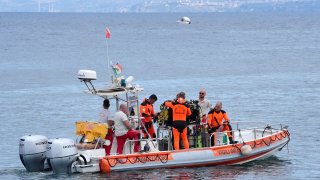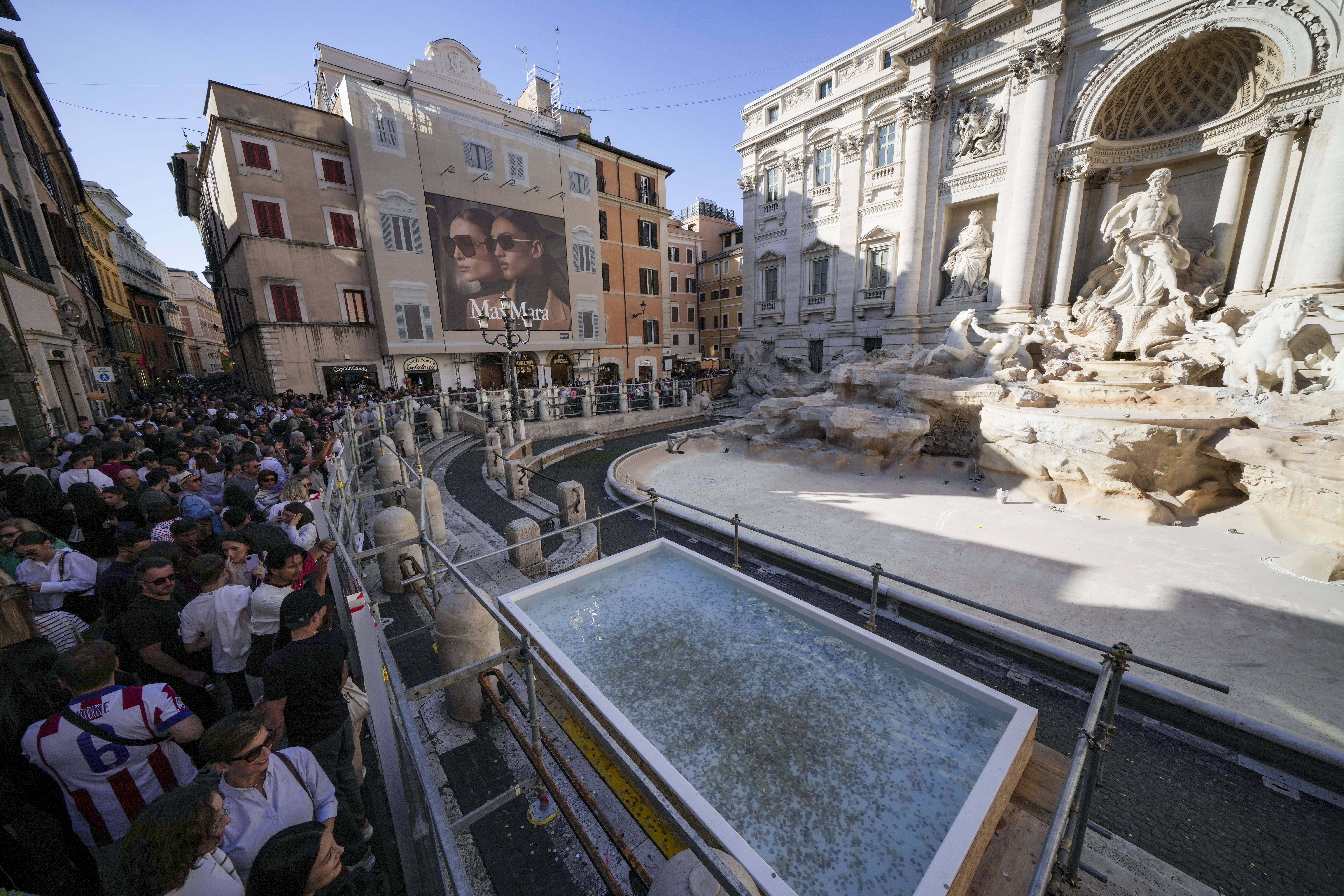
Originally appeared on E! Online
Nobody was trying to reach the lowest depths of the ocean or otherwise test the boundaries of human endurance.
But what was supposed to be a routine pleasure cruise aboard a superyacht turned deadly all the same on the morning of Aug. 19 when the 184-foot Bayesian got caught in a storm and sank off the coast of Sicily.
"I can't remember the last time I read about a vessel going down quickly like that," Stephen Richter of SAR Marine Consulting told NBC News. "You know, completely capsizing and going down that quickly, a vessel of that nature, a yacht of that size."
Of the 22 people onboard, including crew, seven people died. The last of the bodies was recovered Aug. 23, an expectedly sad coda to what had already been a tragic week as the search for answers as to how this happened got underway.
And to be sure, every minute of the Bayesian's ill-fated outing is being fiercely scrutinized, starting with the general seaworthiness of the vessel itself.
Get Tri-state area news delivered to your inbox. Sign up for NBC New York's News Headlines newsletter.
Because, frankly, this was a freak occurrence.
U.S. & World
"Boats of this size, they’re taking passengers on an excursion or a holiday," Richter explained. "They are not going to put them in situations where it may be dangerous or it may be uncomfortable, so this storm that popped up was obviously an anomaly. These vessels that carry passengers, they’re typically very well-maintained, very well-appointed."
But in this case, a $40 million yacht sank, seven people are dead—including a billionaire tech mogul and his 18-year-old daughter—and morbid fascination doesn't need a second wind.
Here is how the story of the Sicily yacht tragedy has unfolded so far:
What happened to the yacht that sank off the coast of Sicily?
The Bayesian had set off from the Sicilian port of Milazzo on Aug. 14 at capacity with 12 guests and 10 crewmembers aboard.
The aluminum-hulled vessel was built in 2008 by Italian shipbuilder Perini Navi and registered in the U.K. Cruise sites listed it as available for charter at $215,000 per week, per the Associated Press.
On the morning of Aug. 19, the superyacht was anchored off the coast of Porticello, a small fishing village in the Sicilian province of Palermo (also the name of Sicily's capital city), when a violent storm hit.
The vessel "suddenly sank" at around 5 a.m. local time, seemingly due to "the terrible weather conditions," the City Council of Bagheria announced shortly afterward, per NBC News.
At the time, only one person was confirmed dead—the ship's chef—but six others were said to be missing. The 15 survivors—who managed to make it onto an inflatable life boat, according to emergency officials—were rescued that morning by the crew of another yacht that had been nearby when the storm hit.
"Fifteen people inside," Karsten Borner, the Dutch captain of the ship that was able to help (the Sir Robert Baden Powell), told reporters afterward, per Reuters. "Four people were injured, three heavily injured, and we brought them to our ship. Then we communicated with the coast guard, and after some time, the coast guard came and later picked up injured people."
When the storm hit, his boat ran into "a strong hurricane gust," Borner said, "and we had to start the engine to keep the ship in an angled position."
They "managed to keep the ship in position," he continued, but once the storm died down, they realized the other boat that had been behind them—the Bayesian—was gone.
The wreck ended up settling 165 feet below the surface, according to Italy's national fire department.
Fire officials said that divers, a motorboat and a helicopter were deployed to search for the missing.
Meanwhile, footage was captured of the ship capsizing on closed-circuit TV about a half-mile away from where it was anchored.
In the video obtained by NBC News, the illuminated 250-foot aluminum mast of the ship appears to list severely to one side before disappearing completely. Survivors recalled having just a few minutes to literally abandon ship.
Who were the seven people who died when the yacht Bayesian sank?
The tragedy initially became headline news because billionaire tech mogul Mike Lynch—"Britain's Bill Gates," some U.K. media called him—was among the missing. His body was ultimately recovered Aug. 22.
"They told me that suddenly they found themselves catapulted into the water without even understanding how they had got there," Dr. Fabio Genco, head of the Palermo Emergency Medical Services, told NBC News Aug. 22. "And that the whole thing seems to have lasted from 3 to 5 minutes."
Genco said he got to Porticello about an hour after the Bayesian capsized.
Survivors "told me that it was all dark, that the yacht hoisted itself up and then went down," he said. "All the objects were falling on them. That’s why I immediately made sure, by asking them questions, if they had any internal injuries."
Why did the yacht sink?
Italian prosecutors are investigating to determine what transpired before the boat went down, according to NBC News.
Meanwhile, the CEO of shipbuilder Perini's parent company The Italian Sea Group defended the vessel itself as "unsinkable."
Perini boats "are the safest in the most absolute sense," Giovanni Costantino told Sky News Aug. 22. What happened to the Bayesian "put me in a state of sadness on one side and of disbelief on the other," he continued. "This incident sounds like an unbelievable story, both technically and as a fact."
Costantino said it had to have been human error that led to the boat sinking, declaring, "Mistakes were made."
"Everything that was done reveals a very long summation of errors," he told newspaper Corriere della Sera Aug. 21, in an interview translated from Italian. "The people should not have been in the cabins, the boat should not have been at anchor."
The weather was "all predictable," he continued, adding that the storm "was fully legible in all the weather charts. It couldn't have been ignored."
The yacht's captain, identified as James Cutfield of New Zealand, was taken to Termini Imerese hospital for treatment. From there, he told La Repubblica, per Sky News, that he didn't see the storm coming.
Borner, the captain of the ship that rescued the 15 Bayesian survivors, told NBC News that he noticed the storm come in at 4 a.m. local time, and saw what looked to him like a waterspout, a type of tornado that forms above water.
The International Centre for Waterspout Research posted on X Aug. 19 that it had "confirmed 18 waterspouts today off the coasts of Italy. Some were powerful waterspouts, one of which may have been responsible for the sinking of a large yacht off of Sicily."
Borner said he didn't know why the Bayesian sank so quickly, guessing "it may have something to do with the mast, which was incredibly long." (A tall mast, even with its sails down, means there's more surface area exposed to wind, which can result in tipping.)
Confirming that one person was dead and six unaccounted for immediately following the wreck on Aug. 19, Salvo Cocina of Sicily's civil protection agency told reporters that a waterspout had struck the area overnight.
"They were in the wrong place at the wrong time," he said.
Who were the seven people who died when the yacht Bayesian sank?
The tragedy initially became headline news because billionaire tech mogul Mike Lynch—"Britain's Bill Gates," some U.K. media called him—was among the missing. His body was ultimately recovered Aug. 22.
The 59-year-old founder of software firm Autonomy had been on the trip with his wife Angela Bacares and their 18-year-old, Oxford-bound daughter Hannah to celebrate his recent acquittal in the U.S. on fraud and conspiracy charges stemming from the $11.7 billion purchase of his company by Hewlett-Packard in 2011.
In a bizarre turn of events, Lynch's co-defendant at trial, Stephen Chamberlain, the former vice president of finance at Autonomy, died after being taken off life support following a road accident on Aug. 17. Chamberlain's attorney told Reuters Aug. 20 that his friend and client had been out for a run when he was "fatally struck" by a car.
Meanwhile, multiple people who contributed to Lynch's defense were on the cruise with him and his family.
The bodies of Morgan Stanley International Chairman Jonathan Bloomer—who testified on Lynch's behalf—and his wife Judy Bloomer, as well as lawyer Chris Morvillo, a partner at the U.S. firm Clifford Chance, and his wife Neda Morvillo, a jewelry designer, were recovered on Aug. 21.
In a LinkedIn post thanking the team that successfully defended Lynch, Morvillo wrote, per Sky News, "And, finally, a huge thank you to my patient and incredible wife, Neda Morvillo, and my two strong, brilliant, and beautiful daughters, Sabrina Morvillo and Sophia Morvillo. None of this would have been possible without your love and support. I am so glad to be home. And they all lived happily ever after…"
The first casualty confirmed Aug. 19 was the ship's Canadian-Antiguan chef, later identified as Recaldo Thomas.
"He was a one-of-a-kind special human being," a friend of Thomas told The Independent. "Incredibly talented, contagious smile and laugh, an incredible voice with a deep love of the ocean and the moon. I spoke to him nearly every day. He loved his life his friends and his job."
Hannah's body was the last of the missing six to be found, with divers bringing her remains ashore on Aug. 23.
Lynch and Bacares, who was rescued, also shared a 21-year-old daughter, according to The Times.
While awaiting trial, Lynch—who maintained his innocence throughout the proceedings—had spent 13 months under house arrest in San Francisco. Back home in London afterward, he admitted to The Times in July that he'd been afraid of dying in prison if he'd been found guilty. (He faced a possible 25-year sentence.)
"It's bizarre, but now you have a second life," he reflected. "The question is, what do you want to do with it?"
(E!, NBC News and Sky News are all members of the Comcast family.)



